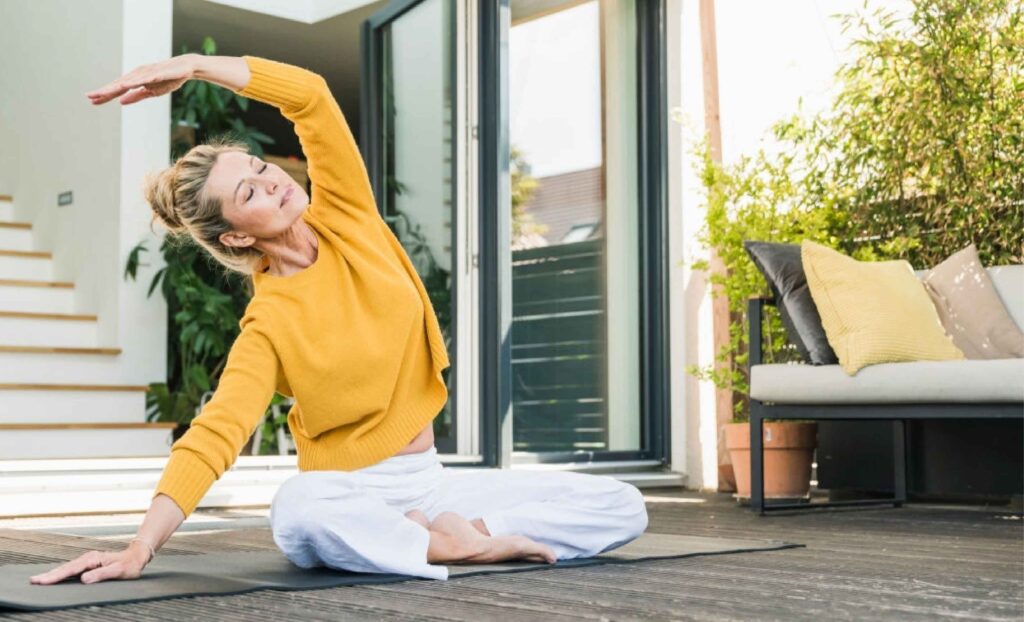With the invention of phones and the internet, we are always connected to one another. While this has its own set of benefits, it also comes with a lot of stress. The overwhelming amount of workload makes stress an ever-present factor in almost everyone’s life. As such, stress is one of the number one causes of triggering many health conditions including heart diseases. There are several activities you can engage in to de-stress and ground yourself, one of them being mindfulness.
Essentially, mindfulness is a form of meditation that brings awareness to what you are experiencing directly. Your attention is focused on your current state of mind, by aligning your innermost thoughts and emotions. Much research has been conducted to determine the effects of yoga, breathwork, and mindfulness on a person’s overall health, mental wellness, and emotional state. And they all conclude that mindfulness is one of the best things you can do to relax and become self-aware.
How To Practice Mindfulness

There are no set rules when it comes to practicing mindfulness. The whole purpose of practicing mindfulness is to take some time off for yourself so that you can forget about your ongoing problems and stress. The time spent is for you to reconnect with yourself and prioritize your feelings and what needs to be done. Mindfulness is all about finding peace within yourself, away from all the external noise.
As such, in order to practice mindfulness, you will need to find a quiet space. The space can be anywhere from a corner in your room, to your balcony or even somewhere out in nature. Your quiet place needs to be such that you feel safe and comfortable to disengage from reality for a little while. You can also add various items to enhance the space and the overall experience. This includes scented candles, humidifiers, soft and soothing music, and lower temperature lights.
Once you are satisfied with your dedicated quiet space, sit in a comfortable position and begin to meditate. As you sit, make sure to concentrate on how you breathe and bring your attention to where you take your breath in and when you exhale. As your breathing begins to become second nature, bring your attention to the thoughts of the day, whether stressful or not. Let them move around until they settle. Finally, as they settle, take in breaths through the mouth and exhale through the mouth. As you keep on meditating, begin to realize that you are not your thoughts – you are the one who has control over what thoughts and emotions you have. Know that you can change your negative thoughts and that you can let go of these thoughts without judgment.
How Does Mindfulness Affect You?

Just like other forms of meditation, the goal of engaging in it is to relax the mind, body, and soul. As such, the acts of meditation and mindfulness are linked to both mental and physical wellbeing. We have listed down some of the benefits below!
Mindfulness and Wellbeing
What does the term wellbeing mean? In simple terms, well-being incorporates your experience and how you feel in your current environment. It lets you become fully engrossed in activities and also react to adverse events more calmly and efficiently. Many people have reported being less caught up in worries, regrets and often less preoccupied with concerns of the future.
In short, practicing mindfulness makes you feel less worried about future events and regretful about the past whilst allowing you to concentrate on creating deeper, more meaningful connections with others.
Mindfulness and Physical Health
Stress has been proven to cause several chronic illnesses such as indigestion, acne breakouts, migraines, blood pressure, along with a number of medical conditions. The practice of meditation isn’t just about sitting in one place and controlling your breathwork. During meditation, your body is required to move in different directions and poses. As such, the movements let your body know that you are in calm mind space.
Mindfulness and Mental Health
Stress is also known to have its effects on mental and emotional wellbeing. It can weigh down on a person’s consciousness and have a negative effect. Emotions often go haywire the more stress is laid on a person. Practicing mindfulness is a way to destress and create positivity in your mind. Many psychiatrists use mindfulness and meditation techniques in order to help a person overcome different mental problems such as depression, anxiety, and anger issues, to name a few.
Yoga
Mindfulness is often used within yoga to promote healthy thinking habits and, by connection, good physical health too. Yoga preaches a message of oneness and finding inner peace by letting go of negative emotions and feelings without judging them for yourself. One of the main ways this is done is through different asanas or postures and by practicing different breathing techniques.
It is within these breathing techniques that mindfulness comes to play. Within most yogic practices exists something known as pranayama, a set of different breathing techniques which help a person to attain self-resolution and spiritual clarity. All of these are what mindfulness is said to do. It can clearly be seen how mindfulness is practiced within yoga and yogic practices.
Furthermore, it should be stated that mindfulness can be practiced by itself and can be done anywhere. It doesn’t take too long to do and can help with obtaining temporary clarity of mind, increased awareness in a tough situation, and even help with chronic pain, fatigue, and other related problems.
Conclusion
Mindfulness exercises are often used by physiotherapists, psychiatrists, and wellness professionals in order to help people with chronic illnesses and emotional distress. With promising research being conducted into how yoga and mindfulness positively affect a person, it will only be a short time before the practice of meditation becomes even more common than it is now.
You can also read: Home Breathing Exercises to Instantly Relieve Anxiety